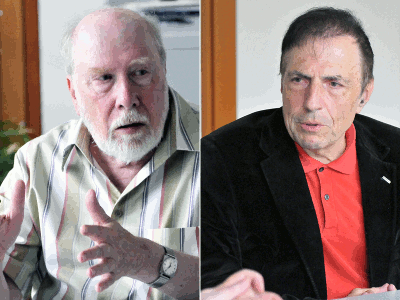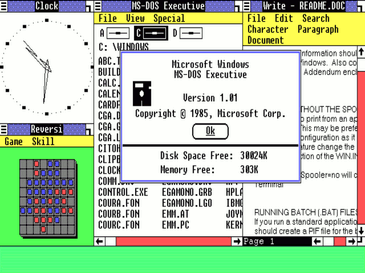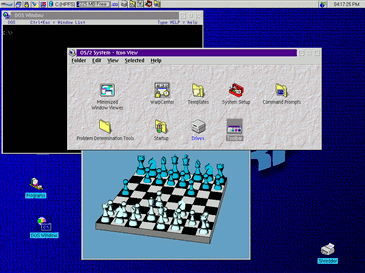What is Oberon?
First question: What is Oberon? Answer:Oberon is one of the 27 moons orbiting around Uranus
and was discovered in 1787 by William Herschel, and this is surely not the reason why you visited this site!
What you want to know is that Oberon is an programming language and an operating system.
It was developed by the swiss computer scientist
Prof. Niklaus Wirth and Prof. Jürg Gutknecht

Niklaus Wirth and his colleague Jürg Gutknecht. Oberon was developed around 1987 on a Ceres workstation and
later ported to the widely used i386 architecture. Popularity declined after year 2000. Today it's only used by a small
group of enthusiasts. So far the facts.
Now i'm going to tell you what oberon means for those enthusiasts i'm proud to be a part of. Oberon was
designed in the late 80's. What a marvelous time! The personal computer industry was raising fast, computers
became affordable for private users, programming languages spread and also did operating systems. An operating
system principally is a framework of commonly needed functions to get access to the computers resources.
Typing in data, storing and retrieving data, system handling, all that stuff we need to do over and over again.
From that point of view it's pretty weird that those sophisticated machines were driven by operating systems
that were not the outcome of an reasonable structured development process. Instead OS's (operating systems)
for PC's were born by some lonely geniuses who definitely had their off-days.
Creations like Gary Killdall's CP/M or Microsoft's MS/DOS were not monolithic design blossoms that teams of
engineers had planned deliberately before writing a single line of code. Instead they were more like primordial
protoplasma suddenly spreading like cancer cells, not driven by an consistent idea but more by an evolutionary
process of trying and copying each other. Features were spreading in this new market not because they were good
but because the young community of enthusiasts was embracing and soaking-in everything new that came
around the corner. Quasi standards manifested for user interaction that were far away from being usable but
they paved the way because they were the first ones to be there. This was not an intelligent driven process, it
was more an uncontrolled boiling primordial soup of ideas! It did so until Mr. Niklaus Wirth said to himself that
is was enough. In the late 80's Mr. Wirth asserted that in a long way the evolving of operating systems lead into
nothing.
MS Windows 1.1

User unfriendly standards condensed in the computer machines, making the system handling nasty and clumsy,
the OS's wasted precious processor and memory resources of the system just because of bad design, the system
structure was unintelligible and opaque to the user and even worse, was lacking simplicity and extensibility.
Even the new OS's like Microsoft's Windows and IBM's OS/2 were principally nothing new but extensions of underlying old principles. Mr. Wirth saw that obviously no one was willing to do what was necessary, to do an engineering approach for an OS design!
IBM's OS/2

So he started to think! He thought about user interaction, information bandwidth of human receptors,
simplicity, intelligent screen layout, absence of useless features that just were hampering users, a small resource
footprint, transparency and extensibility. He thought about it so deeply that he realized he first had to design a
proper programming language to write his new OS, already incorporating all those principles he wanted his OS
to rely on. In just 2 years he and his fellow colleague Mr. Gutknecht built the programming language and system
from scratch. Mr. Wirth also designed a simple and cheap hardware to run his system on. This was the famous
"Ceres" workstation. The operating system and language they both called "Oberon". The name was inspired by
NASA's spacecraft Voyager2 that reached planet Uranus in the time Wirth and Gutknecht finished their first version
of their OS. By reaching Uranus' moon oberon, Voyager2 had gone beyond it's original design goal. That was the
spirit Wirth and Gutknecht wanted their OS to breathe. So they named it and also their programming language
"Oberon". Oberon did it's job so well that Mr. Wirth used it for teaching in the lecturing courses he did in the
ETHZ in Zurich. A whole generation of computer science undergraduates were learning clean structured
programming and clear thinking by Mr. Wirths ideas. Oberon evolved fast until the year 2000 change passed.
About this point Microsofts Windows 95/NT/98 had gained so much popularity by clever marketing strategies
that it out-ruled every competitor from the market. The evil forces of Mordor and his Ork army had won the
battle! Well, not fully. There is still a small but persistent group of aficionados who still use oberon, maintaining
mailing lists and trying to build new oberon machines and port the code.
What do we want?
Me and a handfull of other guys we are
a part of this movement. Our goal in this community is to get the latest version of native oberon running on the
old hardware it was designed for. We built-up systems and actually USE them. Painstakingly we dig through the
sparse documentation, finding out how to install and setup systems, how to operate them, understanding the
user interface, analyzing the applications, extending the system functionality, learning to program it, making the
system structure transparent and most importantly provide informations for all those things as video tutorials
and in written form on this website.
What can you expect?
We want to invite you to follow us on our adventurous quest to be the "Indiana Jones" searching for precious
treasures that were lost and forgotten for long. Truly you don't wanna do this if you
- are an internet geek and social media is everything for you
- you love your smartphone more than anything else
- you're impatient
- you hate programming
- if you're not interested in how things are working
But if you're someone loving simplicity, efficiency and the beautiful elegance of smart ideas, if you're humble in
your attitude and really would love experiencing to understand the operating system you are using, to customize
and tailor it to your needs, to see it flourishing and growing under your hands, to play it like an musical
instrument and maybe finally experiencing yourself in it because it is reflecting all your personality, then you
should put your walking boots on and start to walk with us, because that's the way we are experiencing Oberon!
This site is still under construction. It's content will grow in a pace the administrators can afford. It may be that
some menue links point into nothing and the articles will be revised and corrected permanently.
We will notify you on this main page when everything is stable.
Link to Oberon Fileserver
Here you get a list of tutorials structured by sections
System Installation and Extension
(c) 2018 Native Oberon Tutorials





